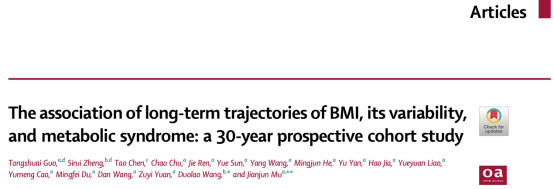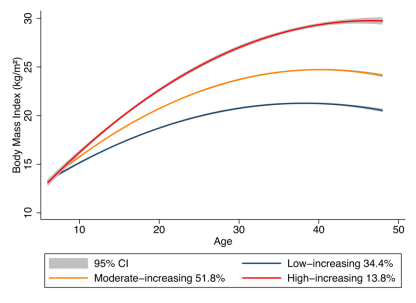On February 12, 2024, Professor Mu Jianjun’s team from the First Affiliated Hospital (FAH) of Xi'an Jiaotong University (XJTU) published the latest original research results as an Article entitled "The association of long-term trajectories of BMI, its variability, and metabolic syndrome: a 30-year prospective cohort study" in eClinicalMedicine (IF=15.1). eClinicalMedicine is an affiliated journal of Lancet, an authoritative medical journal worldwide, which mainly publishes original clinical research. PhD student Guo Tongshuai is the first author. Professor Mu Jianjun is the corresponding author.

Individuals who are obese in childhood are more likely to develop cardiovascular diseases in adulthood. Nevertheless, whether the trajectory and variability of body mass index (BMI) from childhood until adulthood can predict the incidence of MetS in midlife has been rarely studied. In this study, the association of BMI trajectory and its variability from childhood to adulthood and the onset of MetS in midlife was evaluated.

Grouping according to BMI trajectories from childhood to adulthood
Based on "Hanzhong Adolescent Hypertension Cohort Study", the trajectories and long-term variability of adolescent BMI in the past 30 years since 1987 were analyzed by using the group-based trajectory modeling (GBTM). The findings in this study reveal that persistently high BMI trajectory from childhood is intimately associated with the significant increase in the risk of MetS in midlife. The high variability of BMI from childhood to midlife also significantly increases the risk of MetS in midlife. More importantly, the BMI trajectory and its variability from childhood to adolescence are established, demonstrating for the first time that these early BMI trajectories and variability can effectively predict the risk of MetS in midlife. These findings highlight the role of continuous monitoring of children's BMI. As one of key strategies for early identification of individuals with high-risk cardiovascular disease, it is of significance for early prevention and control of cardiovascular disease risk in this population.


Group photo of Professor Mu Jianjun's team
Professor Mu Jianjun's team has been long-term dedicated to basic, clinical and population-based study of primary hypertension and related diseases, and has conducted long-term and continuous follow-up for the "Adolescent Hypertension Cohort" and "Salt-sensitive Hypertension Cohort". After years of hard work, relevant research results have been published in top-notched international journals, such as Lancet, E Heart J, Hypertension and JASN, etc.
The study design, basic experiment and statistical analysis were jointly carried out by Professor Mu Jianjun's team from FAH cooperating with Professor Wang Duolao from Liverpool School of Tropical Medicine, and received guidance and assistance by Chen Tao, a research fellow from the University of York in U.K.
Full-text link: https://www.thelancet.com/journals/eclinm/article/PIIS2589-5370(24)00065-8/fulltext